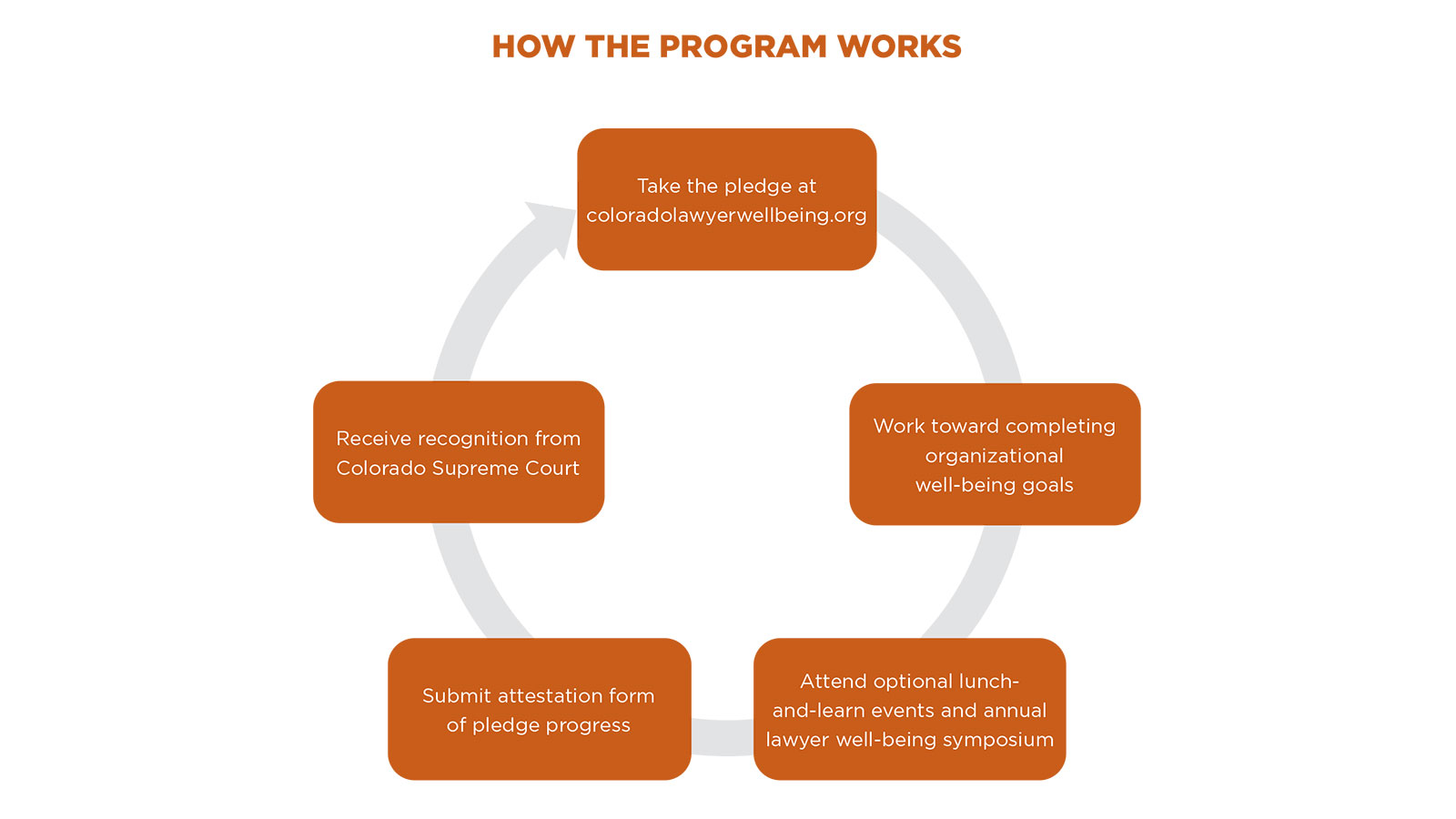
Introducing the Colorado Well-Being Recognition Program for Legal Employers
March 2023
Download This Article (.pdf)
There’s growing concern within the legal profession over a lack of attorney well-being. Data show attorneys suffer from a higher incidence of mental health and substance use issues, and there is a failure to thrive in the profession as evidenced by significant attorney attrition in legal organizations and the profession generally. An expanding body of literature and surveys confirm the magnitude of the problems in our profession:
- A 2016 study of 13,000 currently practicing lawyers found that between 21% and 36% qualify as problem drinkers and 19% to 28% are struggling with significant levels of depression, anxiety, and stress.1
- These problems lead to high absenteeism and underproductive lawyers, resulting in high costs to law firms.2
- Lawyers are leaving law firms at higher rates than ever before. In 2017, law firms lost to attrition an average of 16% of associates annually, with 44% percent of associates leaving within three years and 75% leaving within five years.3
- According to one estimate, the cost of replacing a departing associate ranges from $200,000 to $500,000, or roughly 1.5 to 2 times the annual salary of the associate. This only estimates hard costs and may not include lost productivity, other lawyers’ time, and disrupted intrafirm and client relationships.4
In 2017, the National Task Force on Attorney Well-Being called upon the legal profession to address well-being issues. In response, under the leadership of Justice Monica Márquez of the Colorado Supreme Court, a task force on attorney well-being was formed in 2018 to consider ways to increase lawyers’ and legal organizations’ awareness of these issues.
The Colorado Supreme Court’s Colorado Lawyer Assistance Program (COLAP) addresses these issues per Colo. RCP 254 by providing consultations with behavioral health specialists, voluntary monitoring for mental health and substance use issues, assistance for colleagues or family members who are concerned about a member of the legal profession, and education about both well-being and behavioral health issues. COLAP also assists legal employers through workplace well-being consultations. However, COLAP’s resources are dedicated to serving the entire Colorado legal community and are not specifically geared or equipped to focus exclusively on law firms or places of legal employment.
To promote well-being specifically in Colorado’s legal workplaces, the Colorado Supreme Court is launching a formal recognition program for Colorado legal employers and solo practitioners who demonstrate commitment to improving lawyer well-being. This voluntary program is not meant to replace existing well-being efforts in the profession, but to provide additional ideas, incentives, and support for legal employers seeking to implement well-being best practices.
The program’s primary objective is to provide Colorado legal employers with access to education, resources, support, and technical assistance to improve well-being in their organizations. Additionally, the program creates a Legal Well-Being Leadership Network to encourage dialogue, innovation, and accountability in implementing well-being practices in legal workplaces.
Program Structure
Legal employers and individual attorneys will make an annual pledge to well-being that incorporates the six goal areas listed below. Participants will then have the corresponding calendar year to meet the goals committed to in the pledge form.
During the course of the “pledge year,” participants will be able to participate in multiple facilitated peer-to-peer/group mentoring experiences for well-being education and best practices, mentoring, and idea crowdsourcing to make their organizational well-being work more meaningful and relevant.
At the conclusion of the pledge year, participants will submit an attestation as to the pledged well-being goals achieved. In return, the Colorado Supreme Court will recognize legal organizations for their pledged commitment and their achievements with a recognition event, wall certificate, and electronic website badge.
Six Well-Being Goal Areas
The education and mentoring components of the program will support and encourage legal employers to strive to achieve well-being objectives in six primary goal areas:
- Create a culture of well-being through leadership, accountability, and buy-in. Well-being occurs from the top leadership through the rest of the legal organization. A committed manager or leader should be responsible for developing attorney well-being programs with appropriate buy-in from attorneys throughout the organization.
- Foster competence by developing and supporting programs on substantive development and mentoring. Professional development is an investment that pays off for legal employers: it enhances lawyer competence and effectiveness and instills a sense of dedication and belonging, thereby improving overall morale and well-being.
- Develop work-life integration and flexible work schedules. Flexible work arrangements respect lawyers’ desire for autonomy and some measure of control over their professional and personal lives. There are multiple ways that legal employers can convey that work-life integration is expected, not just accepted.
- Promote diversity, inclusion, and equity to increase organizational success and well-being. Organizations should recognize that increasing cultural competence, addressing institutional and systemic barriers to success for diverse lawyers, and providing welcoming and inclusive work environments and organizational climates will lead to increased attorney wellness and retention.
- Assess compensation metrics to promote well-being. Consideration should be given to alternative ways to compensate lawyers and staff for performance rather than focusing exclusively on the billable hour. Moving away from this single metric can decrease stress on employees, promote greater productivity, and bolster recruitment and retention of lawyers who have families, plan to start families, care for family members, or may be close to retirement.
- Measure outcomes and make improvements. True growth in well-being initiatives comes over time and must be assessed against organizational goals and objectives. A healthy well-being initiative will be measured in the short term, medium term, and long term, and appropriate changes should be made to the initiative at each interval to promote sustainability and innovation.
The collective purpose of these goal areas is to encourage legal organizations to address attorney well-being proactively and to implement recommendations within their organizations to address each of the goal areas. The recommendations are designed on a spectrum to allow legal employers to select and implement recommendations on a scale from easy and comfortable to challenging and disruptive to traditional legal profession paradigms. Each year, legal employers will be encouraged to build on the recommendations implemented in the prior year to progressively implement more revolutionary changes within their organization structure and culture to positively influence well-being.
The program is open to all Colorado legal employers and solo practitioners across the state regardless of size, structure, practice area, or clientele. Program details and engagement options can be found at https://coloradolawyerwellbeing.org.
Conclusion
Colorado has the opportunity to be a national leader in lawyer-led well-being by creating this first-of-its-kind program to incentivize, support, and recognize legal employers for implementing well-being strategies and recommendations within their organizations. Nearly three years into a global pandemic, lawyer well-being is more important than ever. As the research conclusively bears out: (1) well lawyers are more effective and achieve better outcomes; (2) well-being breeds job satisfaction; and (3) well-being reduces the risk of attorney discipline. Promoting attorney well-being is good for business, good for clients, and the right thing to do.
Notes
1. Krill et al., “The Prevalence of Substance Use and Other Mental Health Concerns Among American Attorneys,” 10 J. Addiction Med. 46 (2016).
2. Reich, “Capitalizing on Healthy Lawyers: The Business Case for Law Firms to Promote and Prioritize Lawyer Well-Being,” Geo. U. Law Center (2019), http://scholarship.law.georgetown.edu/facpub.2193.
3. NALP Foundation, Update on Associate Attrition at 12 tbl. 6 (2017).
4. Levit and Linder, The Happy Lawyer: Making a Good Life in the Law (Oxford U. Press 2010).



